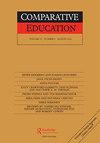比较教育作为一项政治工程
IF 3.7
1区 教育学
Q1 EDUCATION & EDUCATIONAL RESEARCH
引用次数: 4
摘要
本文认为,自第二次世界大战以来,比较教育一直为两个历史集团服务:一个专注于创建支持国际主义的制度和意识形态,另一个专注于遏制共产主义的威胁。这两个版本都支持并证明外国干预国内教育系统是合理的,反映了殖民时期的做法和逻辑。一旦美国成为政治和经济上的霸主,该领域就帮助开发了“高效”教育系统的心智模型和最佳实践,为华盛顿的国际发展努力和资本的利益辩护。随着全球政治经济的变化,比较教育的政治项目也将发生变化。文章假设,随着东亚在全球经济中发挥更大的作用,将出现一个新的经济集团,并据此提出了该领域的未来发展方向。本文章由计算机程序翻译,如有差异,请以英文原文为准。
Comparative education as a political project
ABSTRACT This article argues that since World War II, comparative education has worked in the service of two historic blocs: one focused on creating institutions and ideologies in support of internationalism and a second focused on containing the threat of communism. Both versions have supported and justified foreign intervention into domestic education systems, mirroring colonial practices and logics. Once the United States of America became politically and economically hegemonic, the field helped develop mental models and best-practices of ‘efficient’ education systems, justifying international development efforts of Washington and the interests of capital. As the global political economy shifts so too will the political project of comparative education. The article posits future directions for the field on the assumption that a new economic bloc will emerge as East Asia plays a larger role in the global economy.
求助全文
通过发布文献求助,成功后即可免费获取论文全文。
去求助
来源期刊

Comparative Education
EDUCATION & EDUCATIONAL RESEARCH-
CiteScore
7.40
自引率
21.20%
发文量
35
期刊介绍:
This international journal of educational studies presents up-to-date information with analyses of significant problems and trends throughout the world. Comparative Education engages with challenging theoretical and methodological issues - and also considers the implications of comparative studies for the formation and implementation of policies - not only in education but in social, national and international development. Thus it welcomes contributions from associated disciplines in the fields of government, management, sociology - and indeed technology and communications - as these affect educational research and policy decisions.
 求助内容:
求助内容: 应助结果提醒方式:
应助结果提醒方式:


